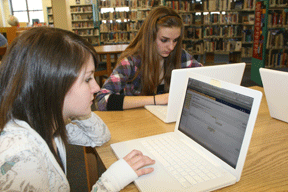
A new state law that requires Florida high school students to take a class online is causing cash-strapped school districts to spend millions on new computers.
And it’s caught the attention of the American Civil Liberties Union, which said Thursday it is calling on school districts to ensure that students who do not have Internet access at home aren’t at a disadvantage when it comes to being able to take online courses.
“We are concerned about issues of access,” said ACLU spokesman Baylor Johnson. “There is a digital divide in this country and Internet access is limited by economic means.”
The new law requires entering high school freshmen beginning this year to take at least one course online prior to graduation. School districts say to meet this new requirement, it means spending money on new computer labs so that students who do not have the Internet at home are able to take online courses.
“This could be considered an unfunded mandate,” said Chris McGuire, the principal of Broward Virtual School.
While most schools already have computer labs, McGuire said, the new law could force districts to buy additional computers and set up more labs for students that can only take the class while on campus.
“We don’t have a good indication of how many students have Internet access at home,” McGuire said, so districts have to estimate how many students will want to use a computer on campus during school hours.
Pam McAuley, the manager of instructional programs at the Hillsborough County School District, said the new requirement would place a burden on already crowded computer lab space.
“As we stand right now, there are no funds to add more computers or lab space,” McAuley said. “We are going to have to get creative site by site and see what kind of lab space they have.”
This shift from merely requiring districts to offer online courses as an option to mandating that students take an online course prior to graduation is a huge policy change, educators say.
In Broward County, which educators say offers one of the best virtual education programs in the state, one study reported that at most, only 20 percent of high school seniors graduate having taken an online course.
This means thousands of students who ordinarily wouldn’t have taken an online course are now required to.
School officials also say there is confusion as to whether special education students are also required to take an online course. “A lot of online courses aren’t built to a lower reading level,” McAuley said.
Florida Virtual School, a state-supported virtual school program that some districts contract with to offer their own virtual classes, said its most popular high school courses include algebra, geometry, Spanish, and a health and physical education class. The school is funded by the state through student enrollment and course completion.
“We expect to see increased enrollments and we are already seeing that with the start of the traditional school calendar,” said Senior Director of Instruction Jodi Marshall. “We currently serve hundreds of thousands of students, however we still serve a small part of the population. We’re excited to have a new audience.”
In Escambia County, school officials say they are working towards getting the word out to all entering freshmen and their parents that taking an online course is now mandatory.
“It is what it is, and there are concerns, but we will work through them,” said Norm Ross, a deputy superintendent for the Escambia County School District.
Ross said there are “companies jumping for joy who want to take advantage of this.” The bill that instituted the requirement was heavily lobbied by for-profit virtual education providers.
Virtual education companies are a fast-growing industry as more states embrace online education. It is championed by Republican lawmakers as a way to give flexibility to school districts and students.
It is also touted as a way to help students preparing for the shift in three years to online-only standardized tests.
Critics of online education say that it makes cheating on assignments and tests easier and for some students, the material is more difficult to understand when delivered over the Web.
Marilyn Myers, the principal of Duval Virtual Instruction Academy, said there will be a “capital cost,” for districts. She estimated the cost of retrofitting a classroom into a computer lab is between $30,000 and $50,000 and that almost every middle and high school in the Duval County School District would need an additional lab.
“As principal of a virtual school, I am a big supporter of it,” Myers said. “It prepares students for taking online courses in college and it’s a step in the right direction.”
By Lilly Rockwell



wow, it’s really cool. I’m glad to read it. And this part: “It is what it is, and there are concerns, but we will work through them,” said Norm Ross, a deputy superintendent for the Escambia County School District.” It would be great if you share this information at https://pro-papers.com/buy-argumentative-essay-online. I would be very grateful